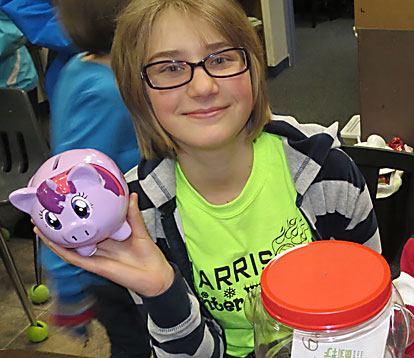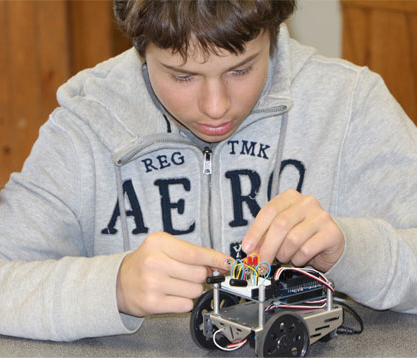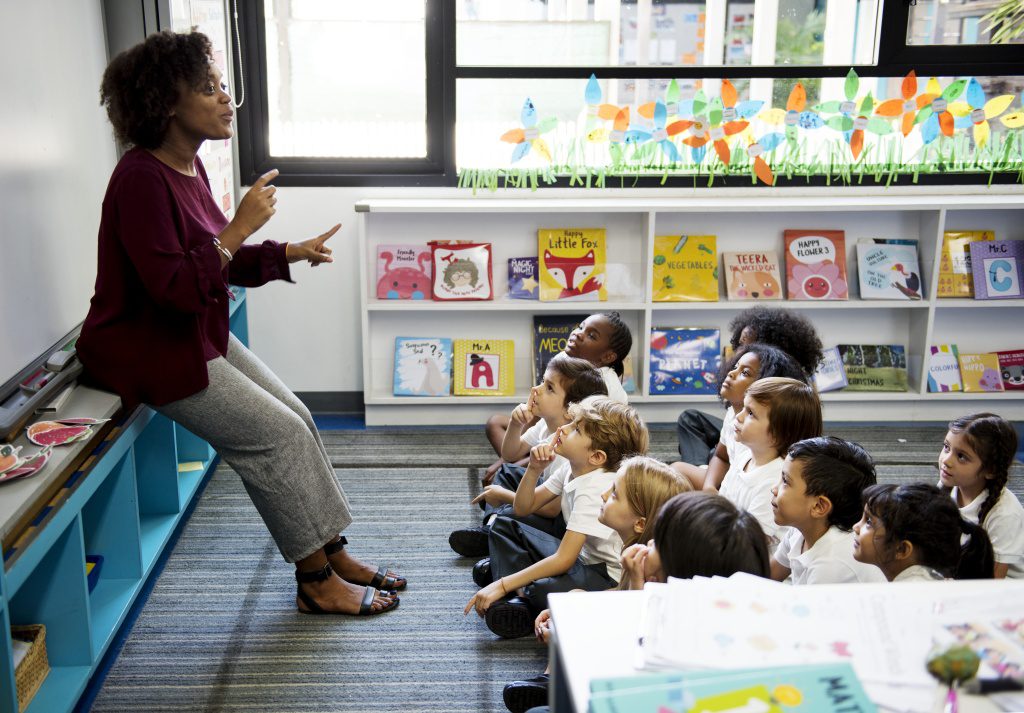650 Church Street, Ste 119, Plymouth, MI 48170

How to know when your child is really gifted and a cut above the rest
-By JoAnn Amicangelo

As a new parent some 30 years ago, Kiyo Morse didn’t recognize her first child’s extraordinary development as signs of giftedness. At 10-days-old, Morse’s daughter was so unusually alert that a family friend said the way she was looking at him was “too weird.”
At 6 months of age, she very clearly said “Hi Papa,” and, though she didn’t speak again until 13 months, she had the vocabulary to tell complete stories two months later. At 18 months, she asked to be shown how to tie her shoes.
At 2 ½ years, she was able to write the letters of the alphabet and at age 6, she figured out how to ride a bike simply by observing her friends.
And I thought my 3-year-old was somehow remarkable–or at least down right funny–when I found her sticking my mini pads all over the bathroom vanity because she thought they were big stickers!
I suspect most first-time parents have entertained the idea that their child is special, talented or gifted in some way. And, to be sure, they are to us. We’ve all proudly shared our stories of the cute or seemingly remarkable things our little ones have done as they’re growing.
But do those unforgettable moments or achievements in our child’s life indicate giftedness? Does that fact that we’re almost scared by our bright and talented children mean we’re dealing with the next prodigy?

As a new parent some 30 years ago, Kiyo Morse didn’t recognize her first child’s extraordinary development as signs of giftedness. At 10-days-old, Morse’s daughter was so unusually alert that a family friend said the way she was looking at him was “too weird.”
At 6 months of age, she very clearly said “Hi Papa,” and, though she didn’t speak again until 13 months, she had the vocabulary to tell complete stories two months later. At 18 months, she asked to be shown how to tie her shoes.
At 2 ½ years, she was able to write the letters of the alphabet and at age 6, she figured out how to ride a bike simply by observing her friends.
And I thought my 3-year-old was somehow remarkable–or at least down right funny–when I found her sticking my mini pads all over the bathroom vanity because she thought they were big stickers!
I suspect most first-time parents have entertained the idea that their child is special, talented or gifted in some way. And, to be sure, they are to us. We’ve all proudly shared our stories of the cute or seemingly remarkable things our little ones have done as they’re growing.
But do those unforgettable moments or achievements in our child’s life indicate giftedness? Does that fact that we’re almost scared by our bright and talented children mean we’re dealing with the next prodigy?
When is a child considered among the estimated 2-5 percent of the population in the United States deemed gifted? The National Association for Gifted Children in Washington, D.C., asserts that though there are many definitions of giftedness, they all include a common element, that is: “A gifted person is someone who shows, or has the potential for showing, an exceptional level of performance in one or more areas of expression.”
Gifted children are ahead of the pack because they develop asynchronously or “out of sync” internally and externally, according to psychologist Linda Kreger Silverman, Ph.D., Director, Gifted Child Development Center, in Denver, Colorado. Their rate of cognitive development is much faster than their physical development, making them more vulnerable because they may become aware of information they’re not emotionally prepared to handle.
In her article, How Parents Can Support Gifted Children, Silverman says the brighter the child, the greater the asynchrony and vulnerability. “She may be age 6 while riding a bike, age 13 while playing the piano or chess, age 9 while debating rules while choosing hobbies and books, age 5 (or 3) when asked to sit still.”
“So you may be able to have a conversation with your gifted 3-year-old about how the universe was formed and yet still struggle with him to go on the potty,” said Larry Johnson, director of marketing development and admissions at Steppingstone, a school for the gifted in Farmington Hills, and father of two gifted sons.

When is a child considered among the estimated 2-5 percent of the population in the United States deemed gifted? The National Association for Gifted Children in Washington, D.C., asserts that though there are many definitions of giftedness, they all include a common element, that is: “A gifted person is someone who shows, or has the potential for showing, an exceptional level of performance in one or more areas of expression.”
Gifted children are ahead of the pack because they develop asynchronously or “out of sync” internally and externally, according to psychologist Linda Kreger Silverman, Ph.D., Director, Gifted Child Development Center, in Denver, Colorado.


When is a child considered among the estimated 2-5 percent of the population in the United States deemed gifted? The National Association for Gifted Children in Washington, D.C., asserts that though there are many definitions of giftedness, they all include a common element, that is: “A gifted person is someone who shows, or has the potential for showing, an exceptional level of performance in one or more areas of expression.”
Gifted children are ahead of the pack because they develop asynchronously or “out of sync” internally and externally, according to psychologist Linda Kreger Silverman, Ph.D., Director, Gifted Child Development Center, in Denver, Colorado.
Their rate of cognitive development is much faster than their physical development, making them more vulnerable because they may become aware of information they’re not emotionally prepared to handle.
In her article, How Parents Can Support Gifted Children, Silverman says the brighter the child, the greater the asynchrony and vulnerability. “She may be age 6 while riding a bike, age 13 while playing the piano or chess, age 9 while debating rules while choosing hobbies and books, age 5 (or 3) when asked to sit still.”
“So you may be able to have a conversation with your gifted 3-year-old about how the universe was formed and yet still struggle with him to go on the potty,” said Larry Johnson, director of marketing development and admissions at Steppingstone, a school for the gifted in Farmington Hills, and father of two gifted sons.
We invite you to explore the Steppingstone approach to teaching gifted children.
There are several steps involved in the process of assessing whether or not your child is gifted. Educational professionals at local schools for the gifted said the first step is having your child evaluated by a licensed psychologist experienced in dealing with gifted children.
In this process a battery of tests is administered to determine your child’s IQ. It is generally accepted that an IQ of 130 and above indicates giftedness. But that score doesn’t tell the whole story.
“If it’s 130 or above, there’s not much question there. If it’s below 130, then we look at the 12 sub test scores and if we see a 19, which is a perfect score, we might take that child,” said Morse, whose three gifted children led her to found Steppingstone where she now serves as head of school.
In addition to the testing, school administrators would invite your child to spend a day at the school to be sure he or she feels comfortable in that setting, while giving experienced teachers the opportunity to further evaluate. They would also talk with you, listening for evidence of the some of the following behavioral characteristics gifted children often demonstrate.
Although these are 10 of the most common ones, educators said not all gifted children will exhibit all of these qualities.
Characteristics of Gifted Children
1. High level of intensity
Gifted children respond to life with greater emotion than the average person. They tend to be very passionate about an area of interest to them and have the ability to sustain that passion for long periods of time. Sometimes their behavior can even seem obsessive compulsive.
“We had a kid who got into horses,” said Lorene Porter, director of lower school, at The Roeper School in Bloomfield Hills. “He read everything about horses. He wrote about horses. He drew horses. He told you everything there was to know about horses. He even whinnied like a horse.”
2. Ability to recognize more options
More than the average child, gifted children recognize earlier on more options for behavior, even those they weren’t offered. And they’re willing to exercise those options. It may be to choose one activity over another, to ask for something or to disagree with you.”That’s why when they’re taking tests they can have problems because they can see more options than the average child,” said Morse.


1. High level of intensity
Gifted children respond to life with greater emotion than the average person. They tend to be very passionate about an area of interest to them and have the ability to sustain that passion for long periods of time. Sometimes their behavior can even seem obsessive compulsive.
“We had a kid who got into horses,” said Lorene Porter, director of lower school, at The Roeper School in Bloomfield Hills. “He read everything about horses. He wrote about horses. He drew horses. He told you everything there was to know about horses. He even whinnied like a horse.”
2. Ability to recognize more options
More than the average child, gifted children recognize earlier on more options for behavior, even those they weren’t offered. And they’re willing to exercise those options. It may be to choose one activity over another, to ask for something or to disagree with you.”That’s why when they’re taking tests they can have problems because they can see more options than the average child,” said Morse.

1. Ability to recognize more options
More than the average child, gifted children recognize earlier on more options for behavior, even those they weren’t offered. And they’re willing to exercise those options. It may be to choose one activity over another, to ask for something or to disagree with you.”That’s why when they’re taking tests they can have problems because they can see more options than the average child,” said Morse.
2. High level of intensity
Gifted children respond to life with greater emotion than the average person. They tend to be very passionate about an area of interest to them and have the ability to sustain that passion for long periods of time. Sometimes their behavior can even seem obsessive compulsive.
“We had a kid who got into horses,” said Lorene Porter, director of lower school, at The Roeper School in Bloomfield Hills. “He read everything about horses. He wrote about horses. He drew horses. He told you everything there was to know about horses. He even whinnied like a horse.”

3. Sophisticated language and thought process
Gifted children may or may not speak early, but whenever they do, they’re able to carry on high level and philosophical conversations. As a result, they tend to want to hang around older children and adults because they’re looking for an intellectual match.
“I know when my son was young, he preferred talking with his aunts and uncles or his teachers when he went to public school, rather than kids his own age, simply because conversation with adults was more stimulating,” said Jeanne Nance, admissions director at the former Gibson School in Redford. “Now that he’s older he enjoys being around kids his own age, but when he was younger, it was harder for him.”
4. Perfectionist
Gifted children have the ability to understand what is perfect in a situation, which can lead to frustration for them if they believe they can’t achieve that standard. Since they want to do things well, they may not be willing to attempt certain tasks.”That’s why at Steppingstone we emphasize that we want them to do quality work in the sense that they’re doing their best, not quality work in the sense of being perfect at it,” said Morse.

3. Perfectionist
Gifted children have the ability to understand what is perfect in a situation, which can lead to frustration for them if they believe they can’t achieve that standard. Since they want to do things well, they may not be willing to attempt certain tasks.”That’s why at Steppingstone we emphasize that we want them to do quality work in the sense that they’re doing their best, not quality work in the sense of being perfect at it,” said Morse.
4. Sophisticated language and thought process
Gifted children may or may not speak early, but whenever they do, they’re able to carry on high level and philosophical conversations. As a result, they tend to want to hang around older children and adults because they’re looking for an intellectual match.
“I know when my son was young, he preferred talking with his aunts and uncles or his teachers when he went to public school, rather than kids his own age, simply because conversation with adults was more stimulating,” said Jeanne Nance, admissions director at the former Gibson School in Redford. “Now that he’s older he enjoys being around kids his own age, but when he was younger, it was harder for him.”
5. Enjoys learning; rapid learner
“Insatiable” is a word often used when describing the learning needs of a gifted child. They tend to have an insatiable curiosity and appetite for learning. They’re fascinated with books and ask many questions, often more than a parent can answer.”
Sometimes it comes out in why, why, why, why, why and sometimes it comes out in experimentation–that little person who has practically flooded the bathroom floor from the water experiments they’ve been doing,” explained Porter.
“So messiness can be a part of their world and, like any child, you have to watch them a lot for safety’s sake.”Morse cautioned that although you would almost always see a big appetite for learning in the young gifted child, you might not see it in the older child. “If they haven’t been nurtured or if being a bright learner doesn’t get good feedback, they go underground,” Morse said.
6. Perseverance
When it comes to pursuing their passions, gifted children stick to it. They demonstrate a sustained passion to figure something out and to learn all they can in their area of interest. “If building a Lego structure, they might build it, take it apart, build and take it apart again and again,” explained Porter.


5. Enjoys learning; rapid learner
“Insatiable” is a word often used when describing the learning needs of a gifted child. They tend to have an insatiable curiosity and appetite for learning. They’re fascinated with books and ask many questions, often more than a parent can answer.”
Sometimes it comes out in why, why, why, why, why and sometimes it comes out in experimentation–that little person who has practically flooded the bathroom floor from the water experiments they’ve been doing,” explained Porter.
“So messiness can be a part of their world and, like any child, you have to watch them a lot for safety’s sake.”Morse cautioned that although you would almost always see a big appetite for learning in the young gifted child, you might not see it in the older child. “If they haven’t been nurtured or if being a bright learner doesn’t get good feedback, they go underground,” Morse said.
6. Perseverance
When it comes to pursuing their passions, gifted children stick to it. They demonstrate a sustained passion to figure something out and to learn all they can in their area of interest. “If building a Lego structure, they might build it, take it apart, build and take it apart again and again,” explained Porter.

5. Perseverance
When it comes to pursuing their passions, gifted children stick to it. They demonstrate a sustained passion to figure something out and to learn all they can in their area of interest. “If building a Lego structure, they might build it, take it apart, build and take it apart again and again,” explained Porter.
6. Enjoys learning; rapid learner
“Insatiable” is a word often used when describing the learning needs of a gifted child. They tend to have an insatiable curiosity and appetite for learning. They’re fascinated with books and ask many questions, often more than a parent can answer.”
Sometimes it comes out in why, why, why, why, why and sometimes it comes out in experimentation–that little person who has practically flooded the bathroom floor from the water experiments they’ve been doing,” explained Porter.
“So messiness can be a part of their world and, like any child, you have to watch them a lot for safety’s sake.”Morse cautioned that although you would almost always see a big appetite for learning in the young gifted child, you might not see it in the older child. “If they haven’t been nurtured or if being a bright learner doesn’t get good feedback, they go underground,” Morse said.

7. Depth of perception
Gifted children see the world in a different way. They have an unusual perspective on life and experiences, and sense earlier than the average child, what’s going on around them. They can see beyond the moment, recognize patterns and have the ability to abstract and problem solve.
They’re able to perceive authenticity in people and as result, often have a great sense of humor early on. Gifted children tend to demonstrate a sense of fairness and need for justice born out of a sense of compassion for others.
“This sense of fairness begins to exhibit itself when, say, you’re in the car listening to NPR and there’s a story about poverty and the child has a sense of what they’re saying about the poor and the lack of food and they’re distressed by it. It doesn’t just slip off their shoulders. The situation is so unfair to them,” said Porter.

7. Depth of perception
Gifted children see the world in a different way. They have an unusual perspective on life and experiences, and sense earlier than the average child, what’s going on around them. They can see beyond the moment, recognize patterns and have the ability to abstract and problem solve.
They’re able to perceive authenticity in people and as result, often have a great sense of humor early on. Gifted children tend to demonstrate a sense of fairness and need for justice born out of a sense of compassion for others.
“This sense of fairness begins to exhibit itself when, say, you’re in the car listening to NPR and there’s a story about poverty and the child has a sense of what they’re saying about the poor and the lack of food and they’re distressed by it. It doesn’t just slip off their shoulders. The situation is so unfair to them,” said Porter.
8. Dislikes repeating or practicing something they already know
Gifted children tend to learn via exploration and they don’t like going over what they already know. It’s not that these children don’t like rote learning; they just don’t like it once they’ve already l earned something.”For instance, they love learning the numbers and letters of the alphabet at age 3. But at age 5, when these things are introduced in kindergarten, the child is no longer interested because he already knows them,” explained Morse.
“If you teach a gifted child the times table in the third grade when it is a challenge for him, he will happily do that. But if you wait until the fifth grade when he’s already figured out that he can look this up in a table or figure it out by adding, then he won’t want to take the time to memorize it anymore. It has more to do with the challenge and their ability to assess.”


8. Dislikes repeating or practicing something they already know
Gifted children tend to learn via exploration and they don’t like going over what they already know. It’s not that these children don’t like rote learning; they just don’t like it once they’ve already l earned something.”For instance, they love learning the numbers and letters of the alphabet at age 3. But at age 5, when these things are introduced in kindergarten, the child is no longer interested because he already knows them,” explained Morse.
“If you teach a gifted child the times table in the third grade when it is a challenge for him, he will happily do that. But if you wait until the fifth grade when he’s already figured out that he can look this up in a table or figure it out by adding, then he won’t want to take the time to memorize it anymore. It has more to do with the challenge and their ability to assess.”

8. Dislikes repeating or practicing something they already know
Gifted children tend to learn via exploration and they don’t like going over what they already know. It’s not that these children don’t like rote learning; they just don’t like it once they’ve already l earned something.”For instance, they love learning the numbers and letters of the alphabet at age 3. But at age 5, when these things are introduced in kindergarten, the child is no longer interested because he already knows them,” explained Morse.
“If you teach a gifted child the times table in the third grade when it is a challenge for him, he will happily do that. But if you wait until the fifth grade when he’s already figured out that he can look this up in a table or figure it out by adding, then he won’t want to take the time to memorize it anymore. It has more to do with the challenge and their ability to assess.”

9. Keen sense of observation and extraordinary memory
Gifted children are able to retain great amounts of information and for longer periods of time. They have a keen sense of observation, cataloguing body language, voice inflections and other details that most don’t.”When my youngest daughter was 2, for example, she told me she didn’t like being born,” said Morse.
“I was a little stunned since we had never talked to her about it, so I said, ‘Well, what do you remember?’ And she took her hands up to her head and ran them down her body and scrunched up her eyes and said it hurt all over and it was very bright and cold. She said, ‘I didn’t like it and I wanted to go back where it was warm.’
Now that [her birth] happened when language was not available to her, so she was somehow able to remember it, catalogue it and, when the language came, to transfer it into language.”
Steppingstone is well known for “unlocking the gift,” and that is truly what our son has experienced.

9. Keen sense of observation and extraordinary memory
Gifted children are able to retain great amounts of information and for longer periods of time. They have a keen sense of observation, cataloguing body language, voice inflections and other details that most don’t.”When my youngest daughter was 2, for example, she told me she didn’t like being born,” said Morse.
“I was a little stunned since we had never talked to her about it, so I said, ‘Well, what do you remember?’ And she took her hands up to her head and ran them down her body and scrunched up her eyes and said it hurt all over and it was very bright and cold. She said, ‘I didn’t like it and I wanted to go back where it was warm.’
Now that [her birth] happened when language was not available to her, so she was somehow able to remember it, catalogue it and, when the language came, to transfer it into language.”
Steppingstone is well known for “unlocking the gift,” and that is truly what our son has experienced.
10. Higher level of sensitivity
Gifted children are more emotionally sensitive than the average child, first about themselves and then others. They can be very compassionate, with a moral sensitivity about them.”They tend to be very empathic and a lot of that is tied up with that ability to observe and to recognize body language, tones of voice, all those things involved with the delivery of a communication. They are really able to read people,” said Morse.
Said Porter, “When you list many characteristics like this, clearly not all children will exhibit all these characteristics all of the time, but when you begin to have a set of them, then you’re probably looking at a gifted child.”
As I reviewed these characteristics in light of my own children’s behavior, I found myself thinking, “that’s my oldest daughter” and “maybe that’s why my youngest often has me at my wit’s end; she’s gifted! Maybe I’m gifted!” Not likely! So as you do your own assessing of your precious children, just keep in mind these characteristics may also be evident in non-gifted children.
“When you’re talking about young gifted children, you’re always talking about more than the average bear. It’s not that gifted children have characteristics that other people don’t have, it’s just that they’re deeper, richer, sometimes more sustained. There’s more passion about learning and it comes sooner,” said Porter.


10. Higher level of sensitivity
Gifted children are more emotionally sensitive than the average child, first about themselves and then others. They can be very compassionate, with a moral sensitivity about them.”They tend to be very empathic and a lot of that is tied up with that ability to observe and to recognize body language, tones of voice, all those things involved with the delivery of a communication. They are really able to read people,” said Morse.
Said Porter, “When you list many characteristics like this, clearly not all children will exhibit all these characteristics all of the time, but when you begin to have a set of them, then you’re probably looking at a gifted child.”
As I reviewed these characteristics in light of my own children’s behavior, I found myself thinking, “that’s my oldest daughter” and “maybe that’s why my youngest often has me at my wit’s end; she’s gifted! Maybe I’m gifted!” Not likely! So as you do your own assessing of your precious children, just keep in mind these characteristics may also be evident in non-gifted children.
“When you’re talking about young gifted children, you’re always talking about more than the average bear. It’s not that gifted children have characteristics that other people don’t have, it’s just that they’re deeper, richer, sometimes more sustained. There’s more passion about learning and it comes sooner,” said Porter.

10. Higher level of sensitivity
Gifted children are more emotionally sensitive than the average child, first about themselves and then others. They can be very compassionate, with a moral sensitivity about them.”They tend to be very empathic and a lot of that is tied up with that ability to observe and to recognize body language, tones of voice, all those things involved with the delivery of a communication. They are really able to read people,” said Morse.
Said Porter, “When you list many characteristics like this, clearly not all children will exhibit all these characteristics all of the time, but when you begin to have a set of them, then you’re probably looking at a gifted child.”
As I reviewed these characteristics in light of my own children’s behavior, I found myself thinking, “that’s my oldest daughter” and “maybe that’s why my youngest often has me at my wit’s end; she’s gifted! Maybe I’m gifted!” Not likely! So as you do your own assessing of your precious children, just keep in mind these characteristics may also be evident in non-gifted children.
“When you’re talking about young gifted children, you’re always talking about more than the average bear. It’s not that gifted children have characteristics that other people don’t have, it’s just that they’re deeper, richer, sometimes more sustained. There’s more passion about learning and it comes sooner,” said Porter.
—JoAnn Amicangelo of Dearborn is a freelance writer and the mother of daughters, Emilie, 8, and Elise, 6.
©Metro Parent Magazine 2003. Reprinted from September 2003 issue with permission.
Gifted and talented education plays a significant role in this regard, providing a differentiated learning experience that caters specifically to the needs of gifted students. We invite you to visit Steppingstone School for gifted children and explore the gifted education from Steppingstone in our Education Curriculum or in AKABA Educational Model
